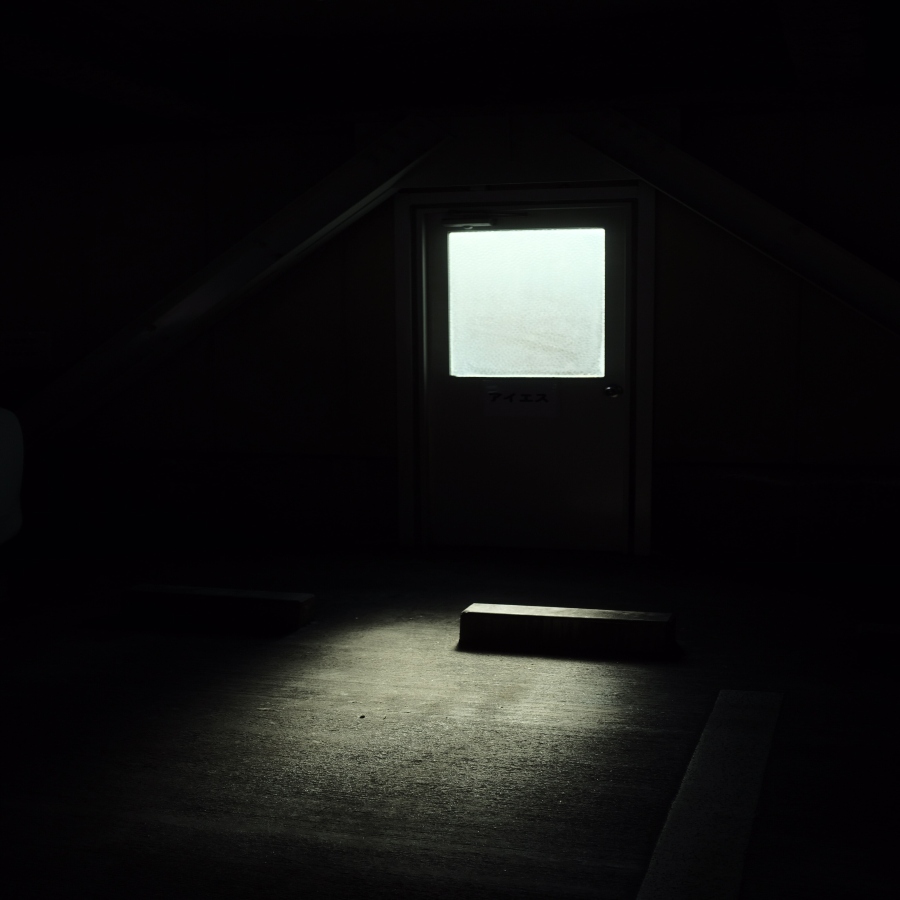She stood in the attic, holding the thin blanket to her chest, transfixed by the dark stain on the mattress. It was summer and the heat here under the slanted raw wood beams lowered itself like a cape around her shoulders. High up she heard a buzz, a fly banging against the one window, a window that could not be opened, that was for show only. Under this heat would the mark on the ticking be wet? Sticky? If she put out one finger and touched it, there at the centre where the colour was almost black what would she feel? What would she see?
A voice floated up from downstairs. It was the woman’s, Mrs. Elliot. The woman who had taken her from the home and given her this space, her first room that was all her own, that she did not share with other children.
“Alice? Alice, where are you?”
She threw the blanket, now damp where her hands had grasped it, onto the mattress, hiding the stain. Smoothing down her dress she hurried for the stairs, taking them as quickly as she could, past the clumps of flies clustering at the landing window, over the board on the attic stair that jumped up when you stepped on it, and down into the kitchen.
Mrs. Elliot was waiting for her. She was a tall woman, almost as thin as Alice, who wore a white shirtwaist and a long black skirt. At her throat was a brooch. Alice saw that it was a lock of hair curled and spread so that it looked like a feather caught under the glass.
“Don’t dawdle Alice. Clean up these dishes and set the table. Mr. Elliot will be home from the store soon and we will have dinner in the dining room. Hurry girl or I will send you back so help me to God.” She left the kitchen and Alice went to the sink. She filled it with water from the attached pump. The heavy iron handle, curved and red, went up and down, one, two, and the water gushed into the basin. Another wonder. At the home she and the other children had carried endless buckets of water for the washing up, of clothes, of dishes, and to fill the tin tub they all squatted in once a week in quick succession to take the worst of the dirt off. The fat bluebottle flies lazily dislodged themselves from the congealed grease and the scraps of bread as Alice picked each plate up to scrape it into a bin before running it under the water. They weren’t angry, they simply settled on the next and the next. Far away Alice heard a baby’s cry. That must be Charlie Boy, the fat infant son of Mr. and Mrs. Elliot. She had seen him dressed all in white lawn being dandled on Mr. Elliot’s knee. She had seen Mrs. Eliot cooing over him in his wicker carriage set out on the shadiest part of the lawn under the old elm tree. Charlie Boy’s image floated there before her eyes like a soap bubble. Alice raised one hand from the water and reached out a finger to pop him, send him away, but he winked out and she finished her task.
In the cool and shadowed dining room, Alice smoothed the clean snowy tablecloth over the table. She walked around it clockwise placing the blue and white patterned plates in their proper places and the bone handled silverware beside them. On the plates, two birds, a bridge, two people in funny hats and clothes with long sleeves, going somewhere, over the bridge, somewhere far away. They might be hidden beneath the joint and the vegetables, but Alice would know they were there, still going on their way to somewhere else. Over the marble fireplace in here hung two pictures, photographs. Alice tasted the word on her tongue, photographs were pictures of people as they really were. Photographs caught them just as they were right at that moment, even though the people still went on and lived, moved, aged, died. Part of them was pinned down forever. One of these photographs was of Charlie Boy, the other was of a young girl. The funny thing about the girl was that her eyes had been painted in. Not her real eyes, under the paint they must have been shut. The painted eyes were open but dead and flat, not like Charlie Boy’s in his photograph There was no way to tell how old the girl with the painted eyes was, maybe her own age, maybe younger. Everyone thought Alice was younger than she was. She was thirteen, but she was small, and thin, and she couldn’t have babies yet like Mamie and Ella. She had carried water to wash their bloody rags and asked them why they were bleeding and why didn’t they die, and they had told her. Alice was not a child and she was not a woman; maybe she was a photograph.
Still and dark and hot. If she didn’t move she might fall asleep, if she moved, the heat which was just clasping her lightly right now would tighten its grip, would suffocate her. Alice stretched out her arms as far as they would go. Her fingertips grazed the stain which had been partially exposed by the blanket bunching beneath her when she got into bed. The sultry air did press down on her, heavy, heavy, a live thing against the length of her body. No matter how quickly she moved her hand away from the mattress, back onto the safe space of the blanket, she knew what was coming now and she was helpless to stop it.
The next morning Mrs. Eliot called Alice to help dress Charlie Boy. Alice stood to one side holding the pins and the bleached square of cotton waiting for Mrs. Eliot to ask for them.
“My boy, my boy,” Mrs. Eliot cooed as she gestured impatiently for Alice to come closer and hand her the things. Alice saw the boy’s fat thighs, and his tiny plump caterpillar curl between them. He waved his fists and Mrs. Eliot laughed and kissed his neck. The baby turned his head to one side, gurgling and smiling and Alice saw his eyes skim over her as if she was not there.
Mrs. Eliot gave her the pail of Charlie Boy’s diapers to wash and hang to dry out in the bright sun. He looked like a doll. Like the china doll, she had once seen when all the children at the home had been taken to a house of a rich man and given cakes and lemonade. The girl that lived at that house had a doll with round cheeks and yellow hair and blue eyes just like Charlie Boy’s. Alice wanted to touch the doll, but she was pulled away just as she put her hand out. “That is not yours, that is not for you to touch. You are a bad little girl.” Matron hustled her out of the room and made her sit on a hard bench in the hallway. She could hear the other children laughing and enjoying their treats, but it was the doll’s eyes and curved cheek she thought about and regretted.
The stink of the diapers brought the flies around, and she brushed their insistent bodies away from her hot face. The water became murky and she changed it, and scrubbed, and bleached, and rinsed and hung the things from the line like flags. There was nothing dirty about them now, and she went on to her other work.
That night the girl came to her. She spoke to Alice from the corner of the dark attic. Alice didn’t need to see her face to know she was the girl whose picture hung over the mantle. Her words made little sense, she was new to being dead and her tongue was not fully formed. The halo of flies that circled the girl’s head didn’t help; the noise they made at times with their buzzing almost drowned out whatever the girl was trying to tell Alice. She strained to understand, but she couldn’t, and her own head was ringing with the hot still air and her desperate need for a drink of water. Mrs. Eliot locked her in at night, so Alice would not wander the house and “steal from them.” There was the basin of water Alice had to wash her face in, and she stumbled out of bed and drank the warm liquid, bending down and lapping from it like a dog. The girl whispered and whispered, and the flies settled on her face and hair like the gentlest of touches and Alice made her way back to bed in a stifling room feeling comforted.
Mrs. Eliot wanted her to clean the oriental rug from Mr. Eliot’s study. Together they had gone into the dark and cool room. In here the shutters over the windows were always shut, and the drapes pulled so that no light came in. Alice was never allowed in Mr. Eliot’s study. She did not dust or straighten in this room. It was locked most days and the glass knob was the only thing Alice ever touched. She would polish it every morning, the facets hard and cold beneath her fingers. But today they were rolling up the rug together and carrying it out to the line behind the house so that Alice could beat the dust and dirt out of it. The golden smell of his pipe tobacco and the dried grass smell of his books floated above their heads as they bent and lifted the rug. Their shoe heels clattering on the now bare floor broke the silence of the room. Looking over her shoulder Alice saw the polished boards, rigid and exposed, and Alice knew it was angry that they were taking away its mask.
With every swing of the rug beater, clouds of dirt lifted from the wool of the rug. Here were bits of manure and mud from Mr. Eliot’s boots, here were strands of his hair, and flecks of that pipe tobacco that smelled like the embers from a dying winter fire. Now the colours were coming through, the rich red and deep brown, the night sky blue. Alice could almost make out the pattern, but its lines doubled back on themselves and you could not tell if they were flowers or feathers or something you had never seen before. The rhythm of her swing became one with her heartbeat and the dust swirled higher and higher until the girl hung in the air before her. The halo around the floating girl’s head constantly shifted as flies flew off to lay their eggs on the newly dead and other flies flew back to keep her company. Alice beat the rug harder and harder to keep her there, to give her time to make sense of the girl’s high and frantic words before she split apart on the breeze. The red eye of the rug glowed, the girl dissolved, and Alice fell onto the grass unconscious while the dust drifted down to cover her.
Alice knelt on the rough floor beside her bed to say her prayers. She could only remember Our Father. Head bowed, eyes open she repeated our father our father our father while watching the stain on the mattress. She stopped her words and lowered her head further. She tentatively put out her tongue and touched it to the stain, to the darkest part. It tasted of rust and salt, the old taste of lost life. When she raised her head, her eyes met the girl’s. The girl’s head and shoulders were halfway out of the mattress. It looked as if the top of her head was moving in ceaseless ripples, but it was only her flies constantly shifting position lifting the hair and burrowing back beneath it. Alice watched the slow dance, the swell and dip like water gushing from the mouth of a pump until still kneeling she fell asleep.
Mrs. Eliot was a weak woman. Alice knew this because she heard Mrs. Lambert tell the woman who brought the milk. Mrs. Lambert was running the house now while Mrs. Eliot was having one of her spells. She had worked at the store for Mr. Eliot, but when Mrs. Eliot took to the back bedroom and cried if any light came in through the windows, he brought her to the house to “keep it up,” and care for Charlie Boy. Mrs. Lambert wore a pink shirtwaist and a blue striped skirt. She was a widower whose husband had died of “old age and pure meanness.” Mrs. Lambert being young had wasted no tears on him but sold the farm and found a job at Mr. Eliot’s store. She was a strong woman. Her cheeks were plump and rosy, and her dark brown glossy hair had hints of red when seen in the sunlight. One day when they were dusting the dining room together Alice heard Mrs. Lambert mutter “morbid” as she ran the cloth over the frame of the girl’s photograph. Alice looked at her. Mrs. Lambert flushed a little. “A picture of her dead daughter where they eat.” She gave the picture one more swipe with the rag. “And to paint the eyes in instead of leaving it be. It just looks funny.” Mrs. Lambert shuddered and handed Alice the cloth. “You finish. I’m going to see if Charlie Boy needs anything.”
Carefully, slowly so she did not spill a drop, Alice was carrying the glass of water up to Mrs. Eliot. She watched the chips of ice off the block in the icebox float and bob in the clear liquid. Down the hall to the back room, the one with the sprigged wallpaper and the narrow bed with the white iron frame. Most of the time it was kept closed, with the girl’s dress laid out over a rocking chair, her pair of black kid boots beneath it, and her glassy eyed dolls staring down from a shelf, just as if she might come in any minute. When Mrs. Eliot had a headache, this is where she went, usually only for an afternoon, but now she had been in the room for a week. Alice knocked softly and pushed the door open. Mrs. Eliot was lying on her side and Alice could only see her shoulder and the braid of her hair snaking down her back.
“Blanche? Is that you?” Alice looked quickly over her shoulder to see if she had brought the girl in with her, but there was no one there, only the empty hall. “Blanche? Come to mother. My head hurts so. Will you rub it dear? Blanche?” Alice put the glass of water down on the table beside the bed and walked softly out of the room. “Blanche? Blanche? Blanche?” She shut the door behind her and went back down to the kitchen to see what she was to do next. Now she knew the girl’s name, and it circled in her head like an insect trapped behind a pane of glass.
Alice pinned the sheets out to the line. White and white and white they snapped in the breeze. It was cooler today and the rasping call of cicadas sawed and shattered the air. Mr. Eliot came home for lunch and he and Mrs. Lambert and Charlie Boy were eating underneath the Elm tree off the blue and white plates that belonged in the dining room. When she carried out the cold chicken to them, Alice saw a brooch on the collar of Mrs. Lambert’s dress. It was a new one, a purple stone in a gold setting, winking in the dappled light. Now as she watched from between the sheets like shrouds Mrs. Lambert lifted Charlie Boy high in the air and shook him, then hugged him close, and the faithless child laughed and shrieked with joy.
Blanche was at the foot of Alice’s bed when she opened her eyes. Now she had found her tongue and tamed her flies so that they hovered just above her brow, their drone low and steady. And she told Alice how her father had torn her open with his need. Her mother had just given birth and could not accommodate him, in fact, she seldom could for she was a weak woman and did not want him in her bed. She told her of the gush of blood and the scratch of the cotton wool packed in to stop the bleeding and the doctor being told it was only her menses and Charlie Boy crying, crying, crying, in the other room to be held to be fed to be cleaned so that her mother could never come to her never had the time or the will. Only her father bringing her a china doll, bringing her a new dress, in fact, the one she was buried in, pleading with her not to tell. She did not last long, was drained as Charlie Boy fattened and thrived, she was paper flat, and they did not even destroy the mattress she had bled out on but left it up here for a servant to use because there could be other children, but things were dear, and nothing must be wasted. Now you know Alice what you must do, now you understand, and Alice did.
Mrs. Lambert did not lock Alice in at night. She did not care if Alice stole from Mrs. Eliot. Down the stairs dressed in her one dress, past the drift of dead flies on the landing windowsill, out into the sleeping house. Here was his room. The carving knife from the kitchen, the one with the bone handle that Mr. Eliot carved the Sunday joint with was in her hand. She bent over the bed where he shifted and muttered in his sleep, his hair in a curl on his cheek and pulled it across his throat. He opened his grey-blue eyes once and stared at her before his soul fled and she wrapped his blanket around his head, so no blood would get on her dress when she lifted him from his crib. The stain on his mattress was deep and rich. She wondered if they would keep it to use again.
For such a fine fat boy he was light as air and she ran down the back stairs and out the door. A full moon lit the path to the privy where she had scraped the waste from his underclothes day after day. They danced along it, she and Charlie Boy, his legs bouncing against her skirt, bobbling a futile beat. Inside the place smelled of dung, animal secrets that every human has. She stuffed Charlie Boy down the hole, bending his legs so that he fit, and heard him land on the night soil with a wet suck. The bone handle knife went in after him and she was free.
Alice ran under the blanched moon across the field behind the house towards the waiting woods. Flies followed her, spreading like a cloak behind her. As she ran she felt something trickle down her thigh. When she touched it and brought her fingers to her face she saw that it was blood, but she did not slow her pace. Alice is becoming what she was meant to be.




